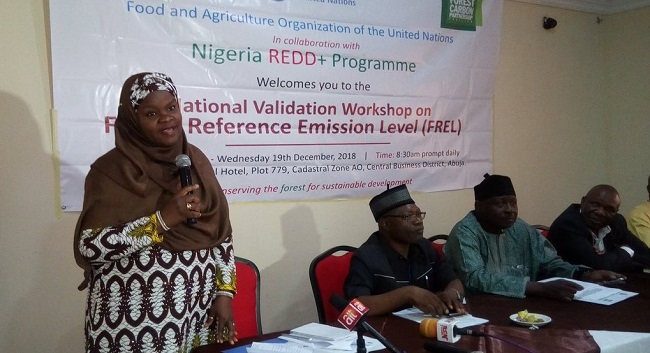The Federal Government has promised to ensure Nigeria attains the 120-degree global emission reduction level with the validation of the National Forest Emission Level Document (FREL).

Mr Lawrence Alibo, the Permanent Secretary, Federal Ministry of Environment, gave the promise on Monday, December 12, 2018 in Abuja at the validation workshop on FREL.
Alibo said that this became imperative as FREL was a benchmark on which Reduction of Emissions from Deforestation and Forest Degradation in Developing Countries (REDD) was measured.
He said that government was working in line with the pledge made by President Mohammadu Buhari at the COP21 in Paris Convention to attain the 120 degree Nationally Determined Contributions (NDC) to reduce global emissions.
He quoted the president as saying that the reduction would meet 20 per cent conditional attainment and 45 per cent unconditional emission reduction.
Alibo said that the validation came at the right time to serve as an opportunity for the country to gauge its performance not only in implementing REDD+ but also in meeting its commitment to the NDC.
He said that the workshop symbolised an advancement of the earlier sub-national FREL development under the UNREDD+ programme and submitted to UNFCCC after a successful technical assessment.
The UN Programme on Reducing Emissions from Deforestation and Forest Degradation (UN-REDD) programme created in 2008 is a collaborative programme of the FAO, UNDP and the United Nations Environment Programme (UNEP), on Reducing Emissions from Deforestation and Forest Degradation in Developing Countries.
“The success story of the UNREDD has continued to serve as a pedestal for the country’s continuous progress toward its climate change mitigation targets, especially in the forestry sector.’’
He said that the steady progress being made had attributed to the additional funding from the World Bank.
According him, this has enabled the expansion of implementation in Ondo, Nasarawa and River states where pilot activities are undertaken.
Ajibo challenged participants to see the workshop as an opportunity to work out modalities on how best to reverse the negative effects of climate change in Nigeria.
“In addition to scaling up emission reduction activities in order to limit the increase in average global temperatures to well below 2 degrees centigrade between now and 2020.’’
Mr Suffyan Koroma, the FAO Country Representative in Nigeria, commended the participants for raising awareness on “National Forest Inventory under REDD programme’’.
Koroma, who was represented by Mr John Fonweban, FAO Forestry Officer REDD + Programme, said the objective of the workshop was to review and adopt the National FREL Report for Nigeria prior to its eventual submission to the UNFCCC for technical assessment.
He said that the step would also enable participants to estimate emission factor for accurate figure based on the destruction of the different types of forest in Nigeria.
Koroma said that FREL would serve as a standard on which future REDD+ activities would be measured during the implementation of the strategy in the country.
The FAO official said that the workshop had become imperative to verify all data collection because inadequate data had been a major factor militating against forestry development in Nigeria.
He said that the socio-economic aspect of the inventory was also very crucial as they provided a better understanding of forest resource use by the population.
Koroma said that the inventory would also help in the establishment of possible links between forest resources use, employment and livelihoods.
“It is an inventory that covers all the land use types in the sense that you have one hectare of forest destroyed and used for agric plantation, you will be able to see how much you are losing,’’ he said.
The FAO official said that the workshop would also serve as tools for advocacy and resource mobilisation for sustainable forest management at the country level.
He said that FAO had succeeded in building the capacity of the relevant stakeholders with the use of modern forestry equipment and techniques as well as in the use of Remote Sensing/GIS (SEPAL) tools for land use mapping.
“It also assisted in change detection and accuracy assessment for Activity Data (AD) estimation.’’
A Forest Reference Emission Level or Forest Reference Level (FREL and FRL) is one of the four elements a country is required to develop in order to participate in REDD+ under the UNFCCC.
The FREL and FRL are benchmarks to assess the country’s performance or judge its effectiveness in the implementation of REDD+ activities.
Participants at the three-day workshop were drawn from ministries of environment across the country and other relevant agencies.
The last forest inventory in Nigeria was conducted over 20 years ago.
